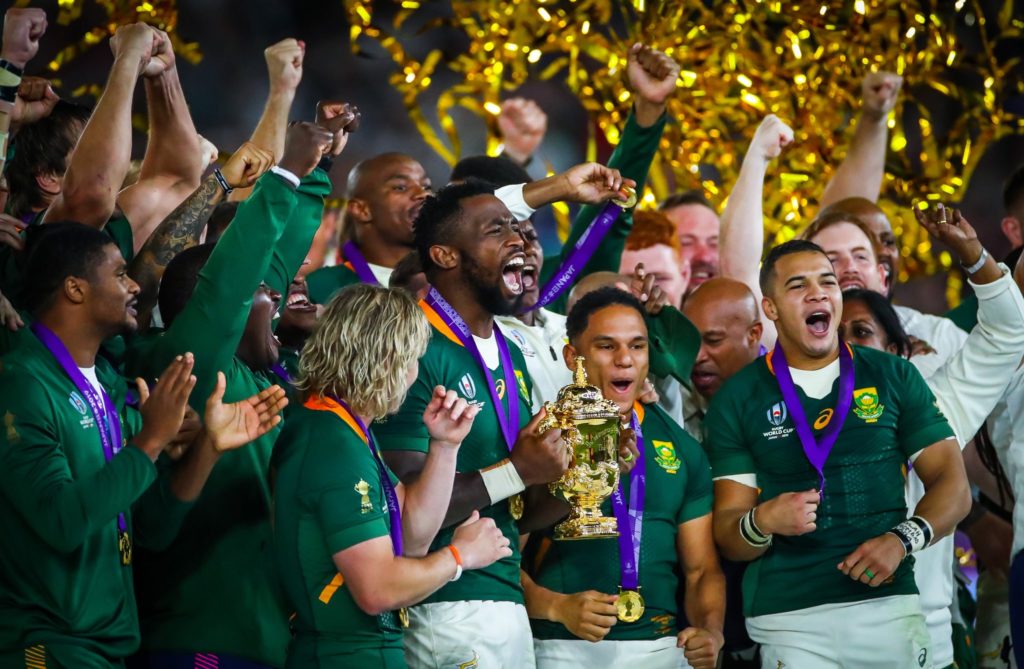An excerpt from a new book looking at how the Springboks won the World Cup has revealed the extent to which the team analysed referees during the tournament.
The book, ‘Miracle Men’ written by Lloyd Burnard, takes an in-depth look at how Rassie Erasmus turned the Springboks from what was considered the lows of 2016 and 2017 to World Cup champions in 2019.
An extract reveals that the Springboks went into great detail in analysing referees who would be in charge of their matches at the 2019 World Cup.
The excerpt shows that Erasmus shifted his approach to ensure the Springboks stayed on each referee’s good side.
Extract from ‘Miracle Men’, which can be purchased online here:
Erasmus‘ new approach to officiating had come months ahead of the tournament, in response to the controversial Owen Farrell tackle during the 2018 end-of-year tour. The coach had set up a panel to provide feedback on the referees the Boks would have in Japan. The plan, simply, was to know as much about the referees as possible so that, on game day, the Boks could be in the best possible position to manage expectations, and they hoped to get the rub of the green when it came to a marginal decision. The research included analysis on how the referees blew games of rugby, from scrummaging to the dark arts at the breakdown and the offside line. But it went much deeper than that.
The level of detail in the refereeing reports included personality traits, all with the hope of finding an edge. The Springboks would role play at team meetings and at training sessions, practising what they would say to the match officials with the research in mind. The report compiled on Garcès, for example, revealed that he responded well to being complimented on his physical appearance. If the match was fast-paced, the Boks would make a point of praising Garcès on his condition and his ability to keep up with the players, hoping to rub him up the right way.
The Boks identified different role players for matches involving Garcès. Siya Kolisi, as captain, was tasked with treating Garcès with respect throughout the contest, working with him to keep the game moving. If there were any issues with how Garcès was blowing the game, those concerns were to be raised by Duane Vermeulen. There were many observers, specifically during the early stages of the World Cup, who suggested that Vermeulen was running the show on the field for the Springboks. That was never the case. It was a predetermined plan from Erasmus and the Boks to keep Kolisi on Garcès‘ good side throughout the match. Vermeulen was simply playing his role.
Another role was reserved for whoever the hooker was on the field – Bongi Mbonambi or Malcolm Marx – and his job was to ensure that the set pieces were as structured as possible throughout. The research suggested that Garcès took kindly to sides that provided a clean set piece. He didn‘t want people wandering around aimlessly at lineout and scrum time; he wanted the players to be in their positions and ready to proceed with the game. He wanted structure, and the Springbok hookers would check in with him throughout the match to make sure they were in the right places at the right times for a set piece, doing their bit to make the game as clean as possible.
The Springboks talked about their plans for each referee, and those plans would involve certain tactics that would have escaped the attention of most onlookers. In some instances, the Boks would deliberately tie their shoelaces or place their hands on their knees when being addressed by the referee, because their research had suggested that certain referees felt intimidated when having to look up at larger, more physically imposing players. Speaking down to a player made some referees feel more powerful or more in control. Every management team at this level would devote time to preparing for the referees, but it is difficult to believe that any team at the 2019 World Cup went to the level of detail as Erasmus and the Boks.
Photo: Getty Images





